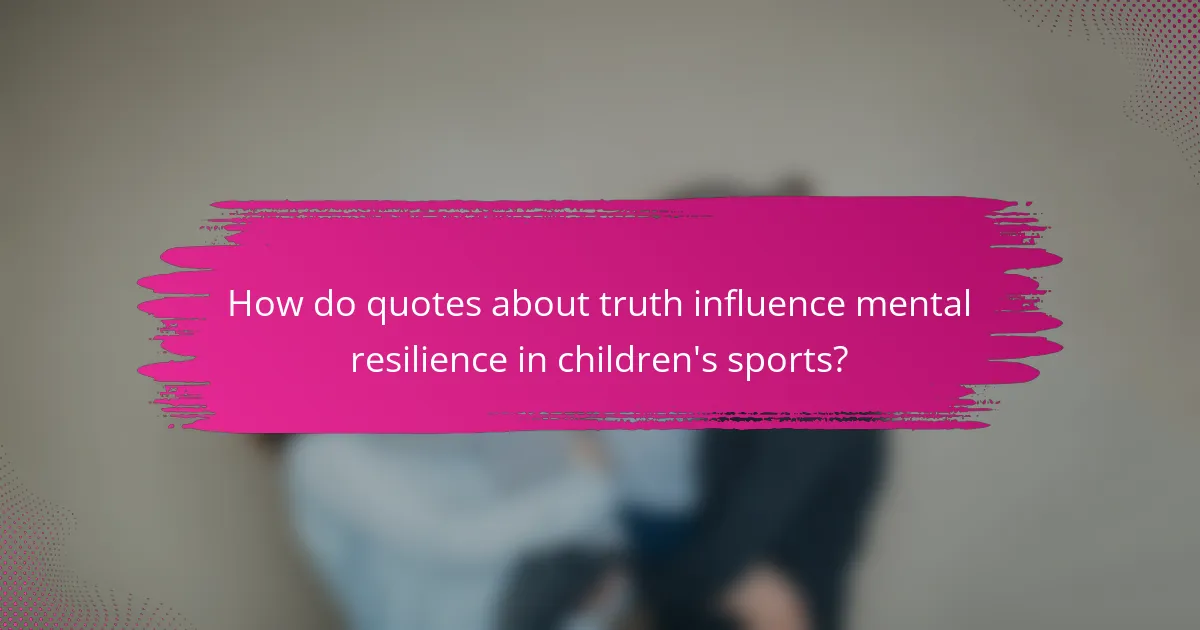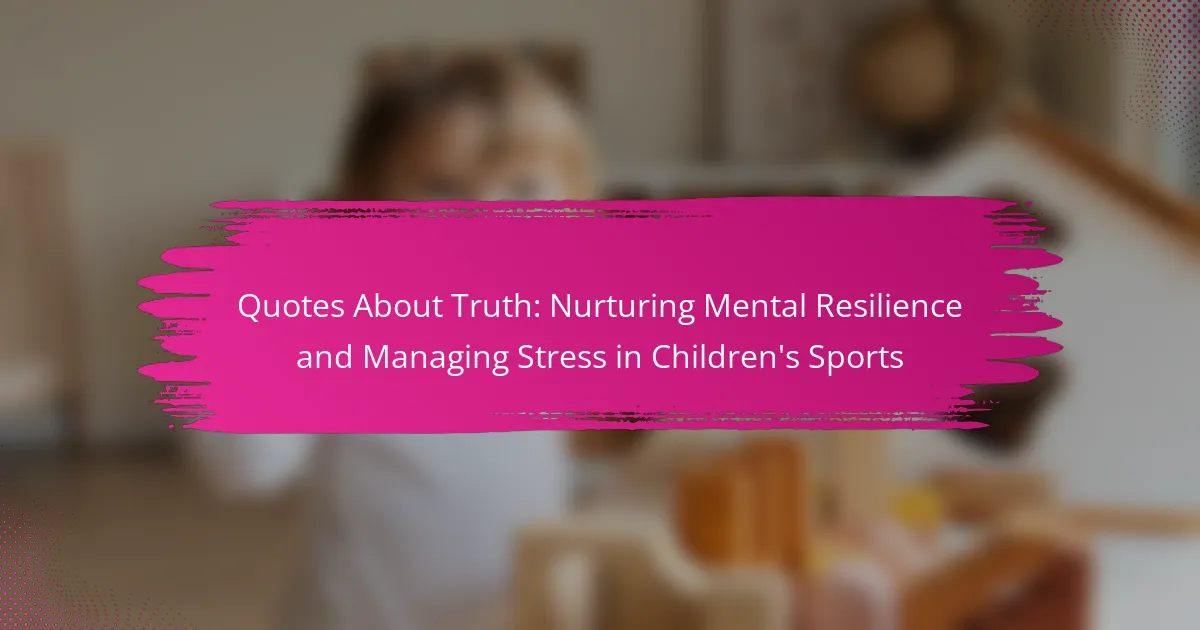Quotes about truth can significantly enhance mental resilience in children’s sports by promoting self-awareness and emotional regulation. They encourage young athletes to embrace challenges and learn from failures. Effective stress management relies on emotional support, skill development, and positive reinforcement. Coaches can integrate these quotes into training to inspire focus and critical thinking.

How do quotes about truth influence mental resilience in children’s sports?
Quotes about truth significantly enhance mental resilience in children’s sports by promoting self-awareness and emotional regulation. They encourage young athletes to confront challenges honestly, fostering a growth mindset. For example, a quote like “The truth will set you free” can inspire children to embrace failures as learning opportunities. This acceptance builds resilience, enabling them to manage stress effectively during competitions. Furthermore, quotes that emphasize integrity can strengthen teamwork and communication, essential attributes in sports. By internalizing these messages, children develop a robust mental framework, enhancing their overall performance and enjoyment in sports.
What are the key themes in quotes that promote mental resilience?
Quotes that promote mental resilience often emphasize determination, self-belief, and the importance of facing challenges. Key themes include embracing failure as a learning opportunity, the power of positive thinking, and the significance of perseverance in sports. These elements help children manage stress and build resilience, fostering a mindset that values growth and adaptability. By internalizing these messages, young athletes can develop a stronger mental framework that supports their performance and emotional well-being.
How do these themes relate to children’s emotional development?
Quotes about truth can significantly enhance children’s emotional development by fostering resilience and stress management in sports. These themes encourage honesty, self-reflection, and accountability, which are crucial for emotional growth. For instance, embracing truth helps children understand their feelings and cope with competitive pressures. Studies show that children who engage with truthful narratives develop better emotional regulation skills. As a result, they can navigate challenges more effectively, leading to improved mental health and performance in sports.
Which quotes are widely recognized for their impact on young athletes?
Quotes that inspire young athletes often emphasize resilience and mental strength. Notable examples include “It’s not whether you get knocked down; it’s whether you get up” by Vince Lombardi, which highlights perseverance. Another impactful quote is “The only way to prove you are a good sport is to lose” by Ernie Banks, teaching humility and grace in defeat. “Success is no accident” by Pele encourages hard work and dedication. These quotes nurture mental resilience and help manage stress in children’s sports.
What specific sports contexts do these quotes address?
The quotes address contexts such as teamwork, perseverance, self-belief, and emotional management in children’s sports. These themes cultivate mental resilience and effective stress management. For instance, emphasizing teamwork fosters collaboration, while self-belief enhances individual performance.

What universal attributes contribute to managing stress in children’s sports?
Effective management of stress in children’s sports relies on universal attributes such as emotional support, skill development, and positive reinforcement. Emotional support helps children feel secure, fostering resilience. Skill development enhances confidence, reducing anxiety during competition. Positive reinforcement encourages a growth mindset, motivating children to overcome challenges. Together, these attributes create a nurturing environment that promotes mental resilience.
How can positive affirmations reduce stress during competitions?
Positive affirmations can significantly reduce stress during competitions by fostering a positive mindset. These affirmations encourage children to focus on their strengths and capabilities, enhancing their mental resilience. Research indicates that positive self-talk can lower anxiety levels and improve performance in sports. By regularly practicing affirmations, young athletes develop a constructive inner dialogue, which helps them manage stress effectively. This approach nurtures emotional well-being, allowing children to enjoy the competitive experience while maintaining focus and confidence.
What role does self-talk play in enhancing performance?
Self-talk significantly enhances performance by fostering mental resilience and reducing stress in children’s sports. Positive self-talk helps athletes maintain focus and build confidence during competitions. Research indicates that children who engage in constructive self-dialogue exhibit improved emotional regulation and better coping strategies under pressure. Encouraging positive affirmations can lead to higher levels of motivation and persistence, ultimately enhancing athletic performance.

What unique attributes of quotes about truth can nurture mental resilience?
Quotes about truth can foster mental resilience by promoting self-awareness and encouraging authenticity. They instill a sense of clarity, helping children navigate stress in sports. Unique attributes of these quotes include their ability to inspire reflection and provide perspective. For example, quotes that emphasize the importance of honesty can empower children to confront challenges directly. This approach nurtures a growth mindset, essential for resilience in competitive environments.
How do personalized quotes resonate with young athletes?
Personalized quotes resonate with young athletes by fostering a sense of identity and motivation. These quotes, reflecting individual experiences, enhance mental resilience and provide relatable guidance. They encourage young athletes to manage stress effectively, promoting a positive mindset. As a result, personalized quotes serve as powerful tools in developing mental strength and emotional well-being in children’s sports.
What factors make a quote memorable for children?
Memorable quotes for children often feature simplicity, relatability, and encouragement. They resonate through clear language, evoke emotions, and provide life lessons. Unique phrasing and rhythmic patterns enhance retention, making the quote more impactful.
In what ways do cultural differences shape the perception of these quotes?
Cultural differences significantly influence how quotes about truth are perceived in children’s sports. These perceptions shape attitudes toward mental resilience and stress management.
For example, in collectivist cultures, quotes emphasizing teamwork may resonate more deeply, reinforcing community values. In contrast, individualistic cultures may favor quotes that highlight personal achievement and self-reliance.
Additionally, cultural attitudes toward failure and success can affect how children interpret these quotes. In cultures that view failure as a learning opportunity, quotes promoting perseverance may encourage resilience. Conversely, cultures that emphasize perfectionism may lead to stress when interpreting similar quotes.
Understanding these cultural nuances enhances the effectiveness of quotes in nurturing mental resilience in diverse sporting environments.

What rare attributes can be found in impactful quotes about truth?
Impactful quotes about truth often contain rare attributes that enhance their significance. These attributes include emotional resonance, cultural relevance, and transformative potential. Emotional resonance allows the quote to connect deeply with individuals, fostering introspection. Cultural relevance ensures the quote reflects societal values, making it relatable. Transformative potential indicates the ability of a quote to inspire change or a shift in perspective, particularly in managing stress and nurturing mental resilience in children’s sports.
How do lesser-known quotes provide unique insights into stress management?
Lesser-known quotes offer fresh perspectives that enhance stress management strategies. These quotes often encapsulate wisdom that challenges conventional thinking, encouraging children in sports to view stress as a manageable part of growth. For instance, a quote emphasizing resilience may inspire young athletes to embrace challenges rather than fear them, fostering a healthier mindset. By integrating these unique insights into training, coaches can cultivate mental resilience, helping children navigate the pressures of competition effectively.
What are some examples of quotes that have emerged in recent years?
Recent years have seen impactful quotes emphasizing truth in children’s sports, fostering mental resilience and stress management. For instance, “Winning isn’t everything, but honesty and effort are” encourages integrity. Another quote, “In sports, truth builds character,” highlights the importance of authenticity. “Embrace challenges; they teach resilience,” reflects the growth mindset essential for young athletes. Lastly, “The truth of effort is more valuable than the trophy” reinforces prioritizing hard work over accolades.
What psychological theories support the effectiveness of these quotes?
Psychological theories such as cognitive-behavioral theory and resilience theory support the effectiveness of quotes about truth in fostering mental resilience and managing stress in children’s sports. Cognitive-behavioral theory emphasizes the role of thought patterns in shaping emotions and behaviors, suggesting that positive quotes can help children reframe negative thoughts. Resilience theory highlights the capacity to adapt to challenges, indicating that inspirational quotes can enhance a child’s ability to cope with stress and setbacks. These theories illustrate how affirmations of truth can empower young athletes, promoting a positive mindset and emotional strength.

What practical strategies can coaches use to integrate quotes into training?
Coaches can effectively integrate quotes into training by using them to inspire and motivate young athletes. Incorporating quotes about truth can nurture mental resilience and help manage stress. For example, sharing a quote before practice can set a positive tone and encourage focus. Additionally, discussing the meaning of a quote during training can foster critical thinking and emotional growth. Coaches might also create a “quote of the week” to reinforce key lessons, making the training environment more reflective and supportive.
How can quotes be used in pre-game rituals to enhance focus?
Quotes can enhance focus in pre-game rituals by providing motivation and reinforcing mental resilience. They serve as reminders of core values, helping young athletes manage stress effectively. For instance, a quote about truth can encourage honesty in self-assessment, fostering a positive mindset. Incorporating quotes into rituals can create a sense of unity and purpose, enhancing team cohesion.
What are common mistakes to avoid when using quotes with young athletes?
To avoid common mistakes when using quotes with young athletes, ensure quotes are age-appropriate, relatable, and constructive. Avoid using complex language that may confuse them. Focus on quotes that foster resilience and emphasize effort over outcome. Ensure the context of the quote aligns with their experiences in sports. Lastly, avoid overusing quotes, as this can dilute their impact and relevance.
What best practices should coaches follow to maximize the impact of quotes?
To maximize the impact of quotes, coaches should integrate them into training sessions and discussions. Use quotes that resonate with mental resilience and stress management to inspire young athletes. Encourage reflection on these quotes to foster deeper understanding. Consistently revisit the quotes to reinforce their messages and relate them to the athletes’ experiences. This approach nurtures a supportive environment that enhances performance and emotional well-being.


